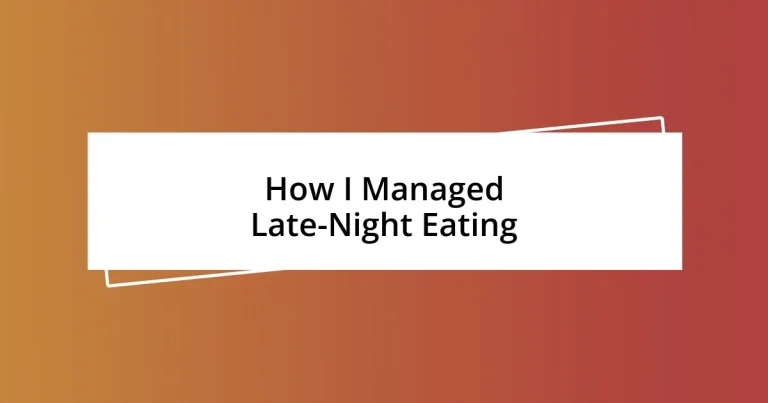Key takeaways:
- Late-night eating often stems from emotional triggers like boredom, stress, or nostalgia, rather than genuine hunger.
- Establishing a structured eating schedule, including meal and snack times, can significantly reduce late-night cravings and promote relaxation.
- Creating a supportive environment with healthy snack options and mindfulness practices can transform late-night routines and improve overall well-being.
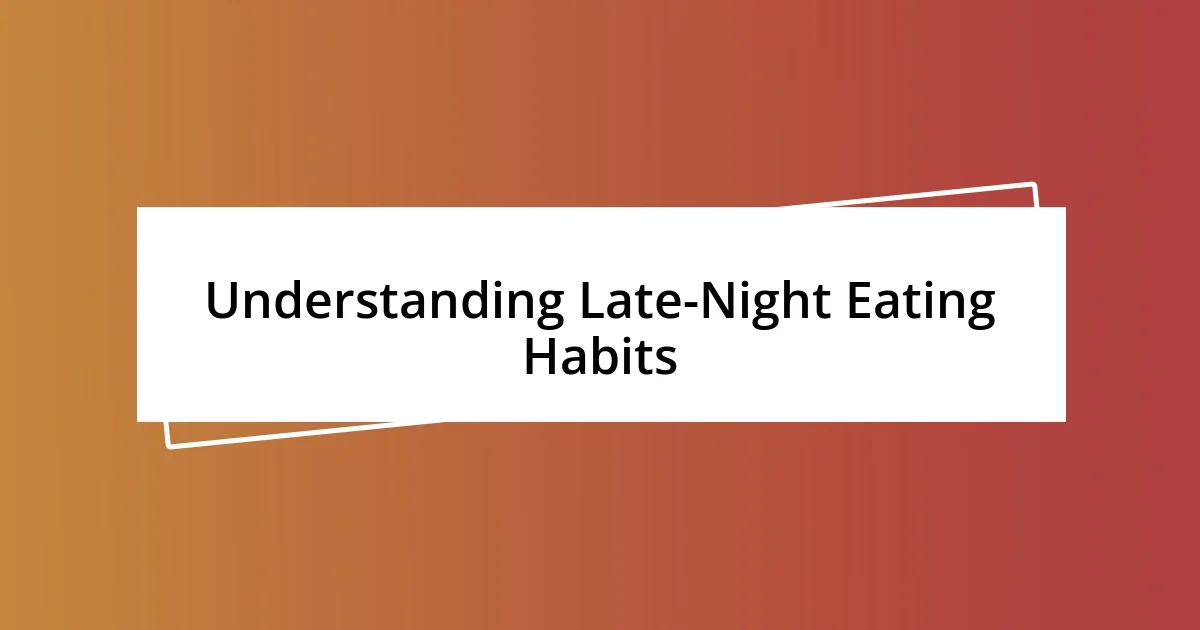
Understanding Late-Night Eating Habits
Late-night eating habits can often stem from a variety of emotional and psychological triggers. I remember those nights when I’d sink into the couch, feeling a whirlwind of stress from the day. The refrigerator became my comfort zone, a place where I could indulge in a snack that momentarily eased my worries. Have you ever found yourself reaching for a late-night snack just because it felt like a reward after a long day?
Many people don’t realize that even small midnight bites can disrupt sleep patterns and metabolism. I used to dismiss this, thinking that a few chips wouldn’t hurt. But what I learned was surprising: those late-night munchies often played havoc with my rest, leaving me groggy and irritable in the morning. It’s fascinating how our late-night eating is frequently tied to deeper emotional states rather than just hunger.
Reflecting on my own experience, I’ve wondered if late-night cravings act like a siren song, calling out to soothe not just hunger but loneliness or boredom. The simple act of eating might actually be a way to fill a void or cope with feelings we might not even consciously acknowledge. Who hasn’t felt the temptation to munch on something while scrolling through social media late at night? It’s worth pondering how our habits align with our emotional landscape.
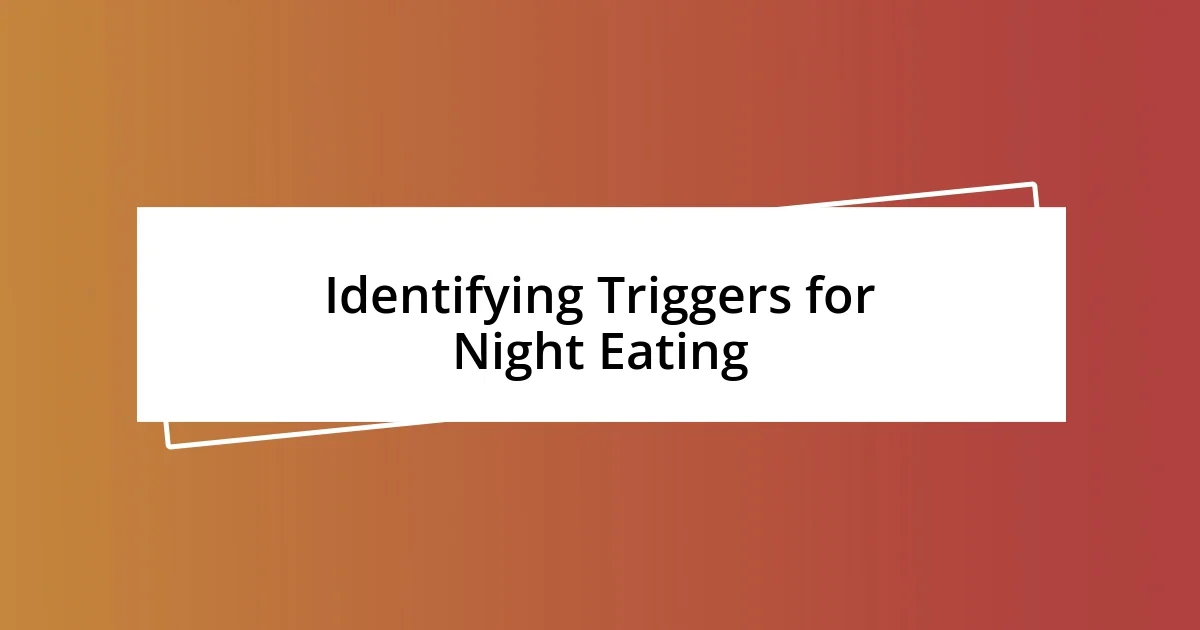
Identifying Triggers for Night Eating
When it comes to late-night eating, identifying triggers can be a game changer. For me, there were nights when boredom creeped in, pushing me toward the kitchen like a magnet. I remember one particularly uneventful evening; I simply couldn’t shake the feeling of restlessness. I found myself rummaging through the pantry, searching for something—anything—to fill that gap. Realizing that boredom rather than genuine hunger prompted my snacking was an eye-opener.
Another significant trigger I encountered was stress. After a long day, I noticed that the urge to snack surged during those quiet hours when I could replay the day’s events in my mind. Instead of addressing my thoughts directly, I would opt for a bag of popcorn. It became almost a ritual for me, encapsulating that feeling of needing to unwind without actually confronting the day’s challenges. I’ve since learned that recognizing this pattern helped me choose healthier end-of-day routines instead of turning to snack foods.
Lastly, emotional connection played a pivotal role. I’d catch myself eating while watching old favorite shows, a nostalgic habit that felt comforting. This behavior wasn’t just about eating; it was about reliving cherished moments, even if they were wrapped in unhealthy choices. Reflecting on this, I learned that mixing food with familiarity often drove unhealthy late-night habits. The challenge becomes how to replace those triggers with alternatives that promote wellness while maintaining connection and comfort.
| Trigger | Description |
|---|---|
| Boredom | Feeling restless and reaching for snacks out of sheer idleness. |
| Stress | Using food as a means to unwind after a long, taxing day. |
| Emotional Connection | Eating while engaging in nostalgic activities like watching favorite shows. |

Developing a Balanced Eating Schedule
Developing a balanced eating schedule has been a transformative journey for me. Once I started to map out my eating times, I realized how structured meals could help curb those late-night cravings. I began to recognize that planning my day around regular meal and snack times not only kept my hunger levels in check but also freed me from those emotional late-night bites.
One key change I adopted was setting a cut-off time in the evening for eating. This was difficult at first, especially during those cozy nights on the couch, but I found that having a designated “last meal” made a world of difference. By sticking to a routine, I trained my body to expect nourishment earlier, which in turn allowed my mind to settle into the evening without the lingering temptation to snack mindlessly. Here are a few tips that really helped me establish this healthy eating pattern:
- Set Meal Times: Designate specific times for breakfast, lunch, and dinner, so your body knows when to expect food.
- Plan Snacks Wisely: Incorporate healthy snacks mid-afternoon or early evening to stave off hunger before dinner.
- Limit Eating Before Bed: Establish a cut-off hour for eating, ideally a few hours before your bedtime, to signal to your body that it’s time to relax rather than seek food.
- Mindful Eating: Focus on enjoying your meals without distractions, helping you feel satisfied and less likely to graze later in the night.
Finding that balance wasn’t just about food; it was about reshaping my entire approach to eating. By being intentional with my schedule, not only did my cravings decrease, but my evenings turned into a time for genuine relaxation rather than a search for snacks to fill emotional voids. It’s remarkable how creating a mindful eating rhythm leads to feeling more in control, fostering a more comforting atmosphere during those end-of-day moments.
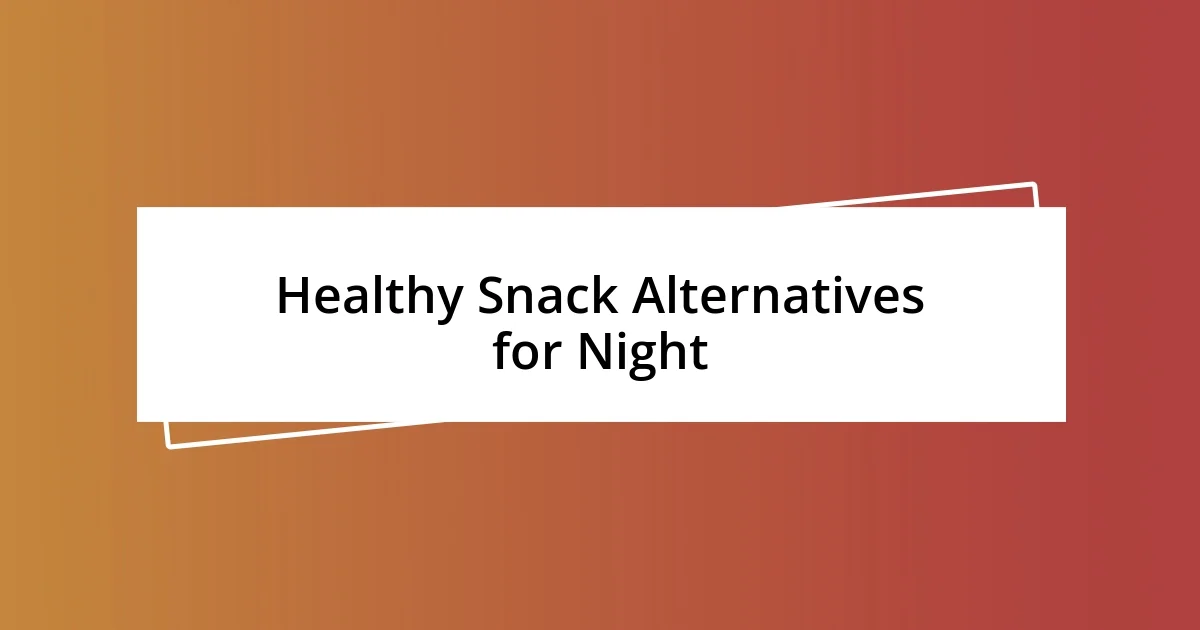
Healthy Snack Alternatives for Night
One of my go-to alternatives for late-night snacking is sliced apples with almond butter. There’s something so satisfying about the crunch of the apple paired with the creamy texture of the almond butter. I remember the first time I tried it; I discovered an easy way to satisfy my sweet tooth without heavy sugars. This combo not only helps me feel full but also gives me a nice boost of energy, which is vital for those late-night projects or just winding down my day.
Another snack that I often turn to is Greek yogurt mixed with a touch of honey and a sprinkle of cinnamon. It feels rich and indulgent, yet it’s packed with protein. I can’t help but smile when I think back to those nights when I would curl up on the couch with my bowl of yogurt. It felt like a treat, but without the guilt of traditional ice cream. Have you ever had a moment where a simple healthy choice transformed your evening? In my experience, that yogurt became a calming ritual that kept me from diving into a bag of chips.
Lastly, I’ve started making homemade popcorn seasoned with light spices like paprika or garlic powder instead of butter. Whenever a movie night rolls around, I find myself prepping this delicious snack instead of reaching for the unhealthy options that used to dominate my evenings. I vividly recall making this switch one Saturday night; the aroma filled my kitchen, and my taste buds danced with anticipation. This healthier twist not only satiated my craving for something crunchy but also turned into a fun preparation activity. It can truly feel rewarding to reinvent those late-night routines and keep them aligned with my health goals.
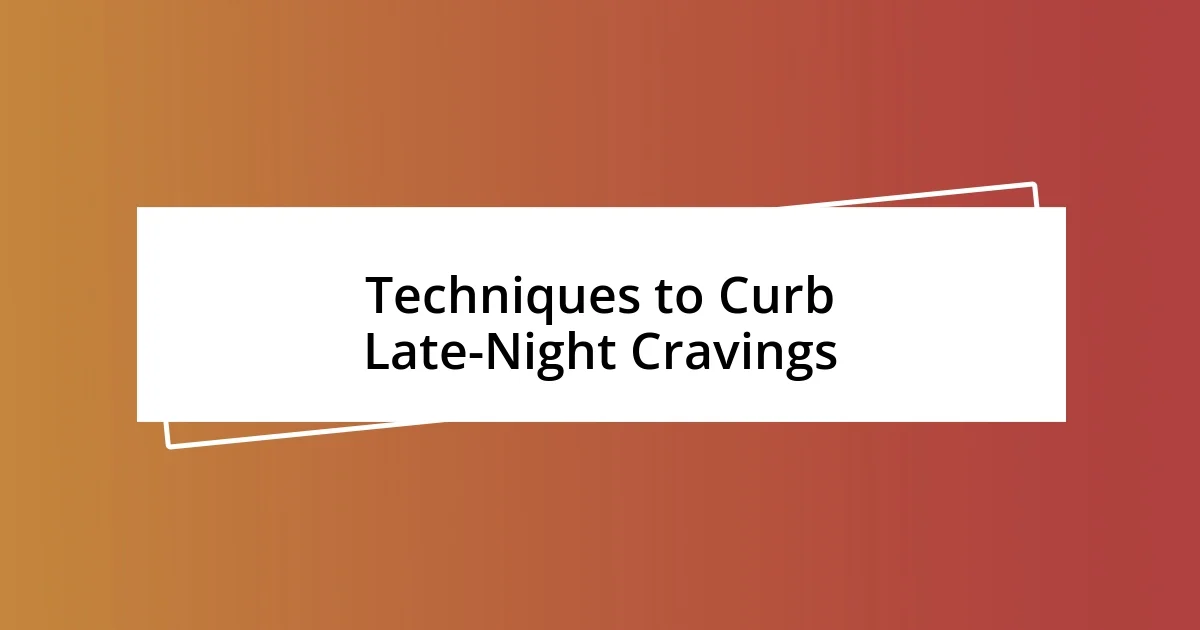
Techniques to Curb Late-Night Cravings
When those late-night cravings creep in, I’ve found that keeping my hands busy really helps. One night, I picked up knitting while binge-watching my favorite show, and surprisingly, I didn’t even think about snacks! The rhythm of the needles kept my mind engaged. Now, I often choose an activity to distract myself, be it coloring or tackling a puzzle. Have you ever noticed how easy it is to forget about food when you’re fully focused on something else?
Another technique that works wonders for me is drinking herbal tea. On those nights that tempt me to reach for something unhealthy, I brew a cup of chamomile or peppermint. Just the warm, soothing experience makes me feel relaxed and satisfied. I recall one particularly stressful evening, where a hot cup of tea felt like the perfect hug from the inside. That indulgence replaces the urge to snack while transforming my mood equally; it’s amazing how a simple drink can quell cravings and foster calmness without calories!
Lastly, I’ve taken to journaling before bedtime, which might sound surprising. When I put my thoughts on paper, it gives me a sense of closure to my day. One late-night, I was feeling overwhelmed and found myself wanting to snack to cope. Instead, I poured my feelings into my journal and realized I didn’t need food; just addressing those emotions was enough to fill me up. Writing doesn’t just clear my mind; it redirects my focus, making late-night snacking feel unnecessary. Have you ever tried reflecting on your day instead of reaching for a snack? It’s a transformative practice that can shift your perspective entirely.

Creating a Supportive Eating Environment
Creating a supportive eating environment has made a world of difference for me. When I decided to declutter my kitchen, I was amazed at how much my surroundings influenced my cravings. By filling my pantry with healthy options and minimizing processed snacks, I noticed my late-night nibbling decreased significantly. Have you ever thought about how much easier it is to make healthy choices when they’re the only options available?
I also learned the importance of lighting when it comes to snacks. Dimming the lights creates a cozy atmosphere, allowing me to enjoy my food mindfully. I recall one evening, dimming the lights as I prepared my favorite snack; it instantly felt like a special occasion rather than a mundane habit. This simple change shifts my focus toward savoring each bite instead of mindlessly munching. Doesn’t it feel good to treat yourself to a little moment of luxury?
Lastly, keeping a designated space for my healthy nighttime snacks has been a game-changer. Having a shelf in the fridge specifically for my yogurt and fruits helps me easily reach for satisfying choices when cravings hit. One night, I found myself wandering into the kitchen, and instead of mindlessly grabbing a bag of chips, I spotted my fruit beautifully arranged. It felt like my healthy snacks were practically calling my name. Have you ever set up your space in a way that makes healthy eating feel effortless? I believe these small changes in my environment have had a significant impact on my choices, making late-night eating much more aligned with my health goals.

Evaluating Progress and Making Adjustments
Reflecting on my progress in managing late-night eating has been a pivotal part of my journey. I try to take a moment each week to assess how my strategies are working. For instance, I noticed that on nights when I didn’t stick to my healthy routines, I felt more guilty and anxious about food choices. Have you ever experienced that sinking feeling when you stray from your goals? I realized that just like any other aspect of life, evaluating my habits allows me to identify what works and what doesn’t.
Adjusting my approach based on my observations has been incredibly rewarding. After a few weeks of keeping track, I discovered that I still craved snacks on certain stressful days. On those nights, I learned to swap out television time with light yoga or stretching, which calmed my mind and curbed my urge to snack. How often do we overlook alternative solutions right at our fingertips? I now find these adjustments essential; they helped reshape my late-night routine into something more mindful and fulfilling.
Sharing my experiences with friends has also been a healthy source of feedback. I recently chatted with a friend who faced similar struggles and found that discussing our challenges sparked new ideas. It’s fascinating to realize how a conversation can shine a light on different perspectives. Have you considered talking about your eating habits with someone else? I discovered that not only can it help us find solutions, but it also fosters a sense of accountability that keeps us motivated on our individual paths to healthier late-night choices.











